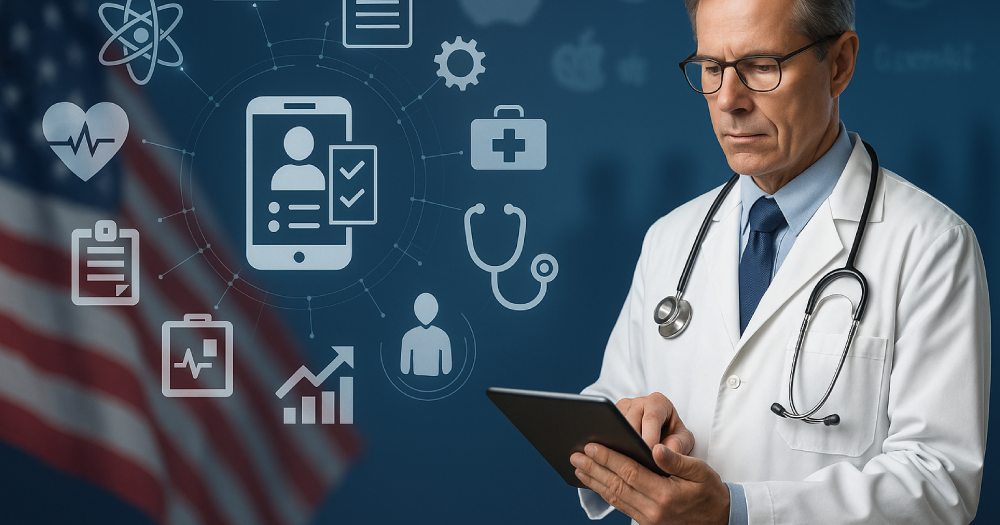White House, tech leaders to create a digital health ecosystem

For far too long, America's healthcare system has felt like something stuck in a time warp — paper forms, fax machines, and scattered records. But that might finally be changing. In a bold move that could mark a turning point in U.S. healthcare, the White House hosted a "Make Health Tech Great Again" summit, drawing top brass from the likes of Amazon, Apple, Google, OpenAI, and Anthropic. The mission? To rip out the red tape and build a digital healthcare ecosystem that puts patients front and center.
"For decades, bureaucrats and entrenched interests buried health data and blocked patients from taking control of their health," said HHS Secretary Robert F. Kennedy, Jr. "That ends today."
The event wasn't just about photo ops. It came with real pledges from more than 60 companies to improve interoperability, reduce provider burden, and — finally — make health data work for the people it's meant to serve.
How will it work?
The plan is to get patients out of the waiting room and into the driver's seat — with their own data in hand. Here's the gist of what's being built:
- CMS Interoperability Framework: A blueprint for how different health systems, EHRs, and apps can safely share data — so you don't have to.
- CMS-Aligned Networks: Health networks that commit to these new interoperability standards will become certified "aligned" and can start exchanging data in early 2026.
- Patient-Focused Apps: Think digital identity credentials, symptom-checking AI assistants, chronic care tools, and paperless check-ins that "kill the clipboard" for good.
- Secure Identity and Access: Patients won't need to juggle logins anymore. Instead, secure digital identity solutions will allow seamless access to health records across platforms.
"Patients will be able to access their data using modern identity solutions, without needing to set up accounts and remember usernames and passwords for each healthcare website," CMS promised. That's a sea change.
And the technology isn't vaporware. CMS is already working on key components like:
- A FHIR-based National Provider Directory
- An upgraded Plan Finder tool
- Real-time Blue Button data sharing
- A secure, modern identity layer for Medicare.gov
- Data at the Point of Care tools for providers
Why does it matter?
Because healthcare's digital growing pains are your pain. Whether it's the pile of forms at every new doctor's office or the maddening inability to see your own records, it's patients — and caregivers — who've borne the brunt of a broken system. That could change.
"We have the tools and information available now to empower patients to improve their outcomes and their healthcare experience," said CMS Administrator Dr. Mehmet Oz. "For too long, patients in this country have been burdened with a healthcare system that has not kept pace with the disruptive innovations that have transformed nearly every other sector of our economy."
Here's why this shift packs a punch:
- Better care: When doctors have all your info, they make better decisions.
- Fewer errors: No more mix-ups from misfiled records or missing histories.
- Lower costs: Digital tools cut paperwork and reduce redundant tests.
- More control: Patients can make smarter, faster health decisions — with the facts at their fingertips.
And it's not just talk. These new tools are expected to roll out quickly, with the first wave of patient apps, aligned networks, and interoperability updates slated for Q1 of 2026.
The context
This isn't a moonshot out of nowhere. The healthcare overhaul has been simmering for years, and this White House event is the latest (and possibly most serious) push to align tech with public health.
Back in May 2025, CMS and the Assistant Secretary for Technology Policy (ASTP) put out a call — literally. They issued a national Request for Information (RFI), asking patients, providers, developers, and insurers how to modernize healthcare's digital infrastructure. The response? A flood of nearly 1,400 comments, underscoring just how overdue this move really is.
That feedback helped shape what's now taking form: a modern, data-rich, patient-driven healthcare experience. CMS is also planning to add a trusted app library to Medicare.gov, making it easier for patients to pick the right tools for managing conditions like diabetes or navigating complex care decisions.
Paula M. Stannard, director of the Office of Civil Rights, was clear that speed won't come at the cost of security. "OCR supports actions that improve the timeliness in providing individuals with access to their electronic protected health information, without sacrificing health information privacy and security."
The tech industry may finally be playing the role it should've years ago: not just selling gadgets or gathering data, but helping Americans live longer, healthier, and more informed lives.
If all goes to plan, the future of U.S. healthcare might just arrive on time — and in your pocket.
💡Did you know?
You can take your DHArab experience to the next level with our Premium Membership.👉 Click here to learn more
🛠️Featured tool
 Easy-Peasy
Easy-Peasy
An all-in-one AI tool offering the ability to build no-code AI Bots, create articles & social media posts, convert text into natural speech in 40+ languages, create and edit images, generate videos, and more.
👉 Click here to learn more


